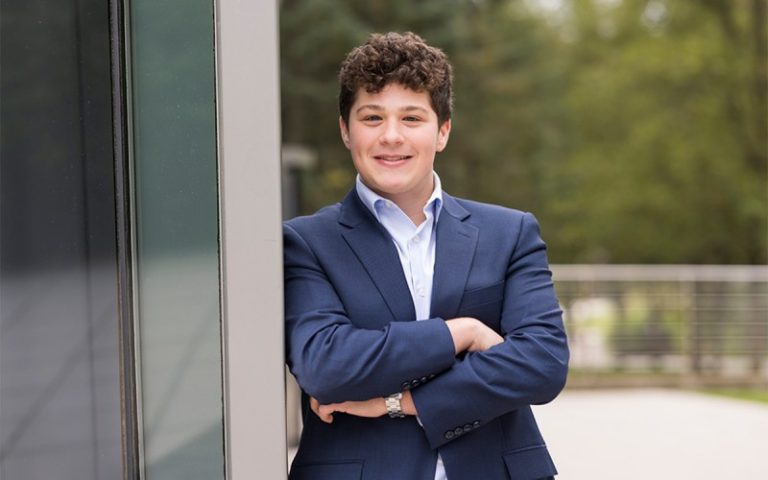If you look at Eric Galinkin’s family, you’ll see that almost everyone is in the medical profession: his father is an infectious disease doctor, his mother is a nutritionist, and his grandfather is a retired pediatrician.
Galinkin always wanted to follow in their footsteps, but was determined to find his own way to make it happen.
Then the COVID-19 pandemic hit. For months, the look of anguish on his father’s face as the number of seriously ill patients rose and medical resources dwindled was telling.
“I’ve heard all about the inefficiencies at hospitals and how my dad’s job isn’t working because he doesn’t have the proper personal protective equipment to treat patients,” said Galinkin, a Long Island native and fourth-year business administration major at Binghamton University’s School of Management (SOM). “While I don’t plan on going into clinical work, I feel like I can be a big help in improving the patient experience and making sure that whoever is sick gets the best care possible.”
Since becoming a student at SOM, he has been eager to explore areas where he could make an impact, which included investigating patient access challenges through a research project with Dean Shelley Dion and Associate Professor Rory Eckert addressing workforce development issues.
This summer, he gained an inside perspective on how to navigate such complex obstacles and expanded his knowledge of the business of running a healthcare organization through an internship at New York Cancer and Hematology Specialists Hospital on Long Island and mentoring with the vice president of administration at Mather Hospital.
In addition to his desire to learn about successful organizational strategies, Galinkin was also interested in seeing New York Cancer & Blood Specialists expand beyond hematology-oncology into other specialties, including primary care, urology, nephrology and radiology.
He spent half of his internship observing different professionals at work, while the other half was involved in various hands-on projects such as automating coding tasks and extensive use of Google Sheets. One of his standout projects was creating a presentation evaluating the company’s partnerships, which was reviewed by executive management.
Through his internship, Galinkin further developed the leadership and organizational skills he had honed through his experience in the EY Student Leaders Program at SOM.
“This internship has given me a better understanding of project management. It may sound simple from the outside, but there are so many departments in healthcare and so many regulations that need to be properly adhered to,” Galinkin said. “I learned how to use the data the company has to make business decisions that will produce the best outcomes for patients and the company.”
Galin was already familiar with the personal dedication of the New York College of Cancer and Hematologists and its CEO, Jeffrey Vasirka, MD, FACP, after witnessing the care he provided to his grandmother.
The internship experience reaffirmed why Galinkin chose to explore this side of health care: without the kind of business expertise he developed at Binghamton — strong leadership and organizational structure — people wouldn’t get the medical help they need when they need it most.
Now he’s excited to see where the journey will take him next.
“If you have your heart set on something that you’re really passionate about, it might not be the traditional path in business like accounting or finance or marketing, but you should go for it and create opportunities for yourself,” Galinkin says. “For me, that’s helping people in the health care field.”

